
Archivio (469)
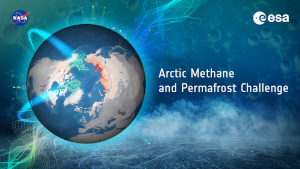 The European Space Agency (ESA) is organising an Earth Observation (EO) training course in collaboration with the NASA Jet Propulsion Laboratory (JPL) and the Svalbard Integrated Arctic Earth Observing System, SIOS. The course will be held for researchers, students, PhD students and young professionals who use EO technology within their research or work and want to improve their knowledge of remote sensing. In total 24 students can attend the summer school.
The European Space Agency (ESA) is organising an Earth Observation (EO) training course in collaboration with the NASA Jet Propulsion Laboratory (JPL) and the Svalbard Integrated Arctic Earth Observing System, SIOS. The course will be held for researchers, students, PhD students and young professionals who use EO technology within their research or work and want to improve their knowledge of remote sensing. In total 24 students can attend the summer school.
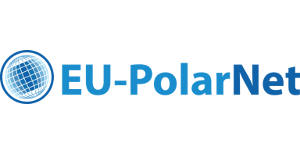 The third EU-PolarNet 2 Call for Services is now open! With the call, EU-PolarNet 2 asks to formulate activities related to research needs of the European Polar Research Programme.
The third EU-PolarNet 2 Call for Services is now open! With the call, EU-PolarNet 2 asks to formulate activities related to research needs of the European Polar Research Programme.
A kind of seed money will be offered to support the preparation, planning or development of new ideas and lines of research, (e.g. workshops, desk studies or travels).
Applications must be received by 20th of December 2022 – 14:00 CEST.
 The EU-PolarNet 2 Call for Services is open for submissions until 20 May 2022.
The EU-PolarNet 2 Call for Services is open for submissions until 20 May 2022.
EU-PolarNet 2 seeks support from the European Polar Community to develop ideas for concrete research activities. For this purpose, EU-PolarNet 2 will open Calls for Services for all six research needs of the European Polar Research Programme.
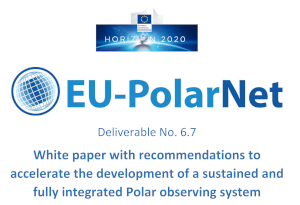 This EU-PolarNet 2 White Paper provides more than 80 actionable policy-level recommendations within seven pillars, to strengthen international collaboration in polar observation and facilitate transfer of knowledge between the Arctic and the Antarctic. The recommendations seek to consolidate existing initiatives, integrate infrastructures and funding mechanisms to enhance collective comprehension of polar environmental changes. Collaboration between EU (European Union) Member States and non-EU Arctic and Antarctic countries is recommended to address climate change threats and to encourage unity among nations in polar observation. DOI:/10.5281/zenodo.10929817
This EU-PolarNet 2 White Paper provides more than 80 actionable policy-level recommendations within seven pillars, to strengthen international collaboration in polar observation and facilitate transfer of knowledge between the Arctic and the Antarctic. The recommendations seek to consolidate existing initiatives, integrate infrastructures and funding mechanisms to enhance collective comprehension of polar environmental changes. Collaboration between EU (European Union) Member States and non-EU Arctic and Antarctic countries is recommended to address climate change threats and to encourage unity among nations in polar observation. DOI:/10.5281/zenodo.10929817
 The side event will start the Joint Action on Polar Research. The workshop shall identify challenges, best practices, and next steps for implementing cross border access to polar research facilities and infrastructure. MORE INFO
The side event will start the Joint Action on Polar Research. The workshop shall identify challenges, best practices, and next steps for implementing cross border access to polar research facilities and infrastructure. MORE INFO
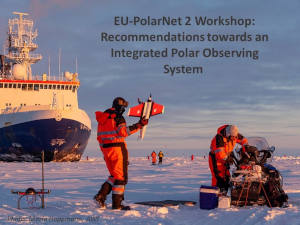 EU-PolarNet 2 will arrange an on-line workshop on 7th June 2022 at 13-18 CEST, aiming to facilitate better alignment of observing system efforts in the Arctic and Antarctic, and to create actionable policy-level recommendations to accelerate the development of an integrated polar observing system.
EU-PolarNet 2 will arrange an on-line workshop on 7th June 2022 at 13-18 CEST, aiming to facilitate better alignment of observing system efforts in the Arctic and Antarctic, and to create actionable policy-level recommendations to accelerate the development of an integrated polar observing system.
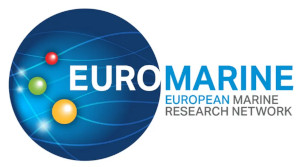 The annual Open Science Day on the 13th of February, themed Science at the boundaries: Addressing the brink of the social-ecological and climatic tipping points of marine ecosystems. Welcomes scientists, experts, and stakeholders to participate in designated sessions.
The annual Open Science Day on the 13th of February, themed Science at the boundaries: Addressing the brink of the social-ecological and climatic tipping points of marine ecosystems. Welcomes scientists, experts, and stakeholders to participate in designated sessions.In un articolo appena pubblicato on-line sulla rivista scientifica internazionale Geomorphology, Andrea Securo e Renato R. Colucci (CNR-ISP) hanno sfruttato i vantaggi offerti dalla tecnologia LiDAR per monitorare le variazioni di 75 depositi di neve e ghiaccio nel Massiccio del Monte Canin, Alpi Giulie, tra il 2006 ed il 2018. La ricerca è svolta all’interno del progetto CryoKarst.
Nella foto: Colucci R.R., Basso Bondini M., Del Gobbo C. e alcuni tirocinanti dell’Università degli Studi di Trieste dopo una giornata di rilievi sul campo. Foto di A. Securo
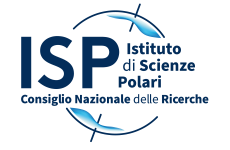 Title: Exploring and exploiting the diversity of extremely halophilic prokaryotic communities in food-grade salts and high salt-fermented food stocks
Title: Exploring and exploiting the diversity of extremely halophilic prokaryotic communities in food-grade salts and high salt-fermented food stocks
Acronym: EXPLO-HALO
Principal Investigator ISP: Mikhail Iakimov
Research Unit Leader ISP: Violetta La Cono
Leading Institution: Institute of Polar Sciences (CNR-ISP)
Funding: CNR, Unità Relazioni Europee e Internazionali
Period of activity: 2020 - 2022
More...
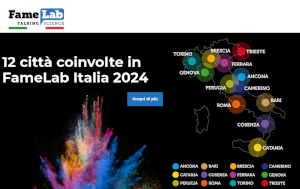 Sono aperte le candidature all’edizione 2024 di FameLab, la competizione internazionale per giovani ricercatrici e ricercatori con il talento della comunicazione. FameLab Italia (www.famelab-italy.it) è coordinata dalla società di comunicazione della scienza Psiquadro Srl in collaborazione con il Cheltenham Science Festival e realizzata nel 2024 in partnership con diversi partner scientifici e culturali tra cui il Consiglio Nazionale delle Ricerche.
Sono aperte le candidature all’edizione 2024 di FameLab, la competizione internazionale per giovani ricercatrici e ricercatori con il talento della comunicazione. FameLab Italia (www.famelab-italy.it) è coordinata dalla società di comunicazione della scienza Psiquadro Srl in collaborazione con il Cheltenham Science Festival e realizzata nel 2024 in partnership con diversi partner scientifici e culturali tra cui il Consiglio Nazionale delle Ricerche.
Dettagli della competizione sul sito CNR
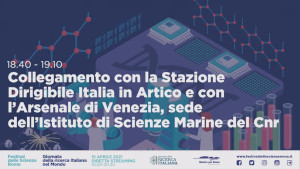 CNR - Collegamento con la Stazione Dirigibile Italia in Artico
CNR - Collegamento con la Stazione Dirigibile Italia in Artico
Video intervento di Maria Chiara Carrozza - Presidente CNR
Video intervento di Fabio Trincardi - Direttore del Dipartimento scienze del sistema Terra e tecnologie per l'ambiente del CNR
Video intervento di Carlo Barbante - Direttore Istituto scienze polari del Cnr (CNR-ISP)
Video del collegamento con la base artica Dirigibile Italia
(Maria Silvia Giamberini Ricercatrice del CNR-IGG, Claudio Artoni Ricercatore del CNR-ISP e due dottorandi dell'Università Ca'Foscari di Venezia)
Un futuro sott'acqua - Adattars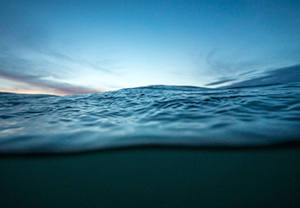 i a un mare che sale
i a un mare che sale
Lectio Magistralis con Sandro Carniel (CNR-ISP)
Fino a quando i nostri mari continueranno a crescere? Di quanto può aumentare il loro livello entro la fine di questo secolo? E soprattutto, possiamo invertire questa tendenza? Scopriremo qual è il punto di vista a riguardo della comunità scientifica, quali sono le azioni di adattamento a un problema che avrà impatti enormi entro pochissimi anni, e quali le possibili azioni e vie da intraprendere per ridurli.
Maggiori informazioni sulla pagina del Festival delle Scienze di Genova
Scadenza 31 ottobre 2023
 Ministero dell'Universita e Ricerca
Ministero dell'Universita e Ricerca
Programma Ricerche Artico
Programma Nazionale di Ricerca in Antartide
 Ministero degli Affari Esteri e della Cooperazione Internazionale
Ministero degli Affari Esteri e della Cooperazione Internazionale
L'Italia e l’Artico
L’Italia e l’Antartide
CNR-ISP
Consiglio Nazionale delle Ricerche
Istituto di Scienze Polari
c/o Campus Scientifico - Università Ca' Foscari Venezia - Via Torino, 155 - 30172 VENEZIA MESTRE (VE)
Salvo diversa indicazione, il contenuto di questo sito è concesso in licenza : Attribuzione - Non commerciale - Condividi allo stesso modo 4.0 Internazionale (CC BY-NC-SA 4.0) 
Privacy policy e Cookie policy - Amministrazione trasparente CNR






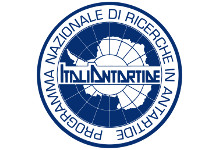 Title: Laghi Mercer e Whillans: Evoluzione di un Ambiente Subglaciale Idrologicamente attivo
Title: Laghi Mercer e Whillans: Evoluzione di un Ambiente Subglaciale Idrologicamente attivo 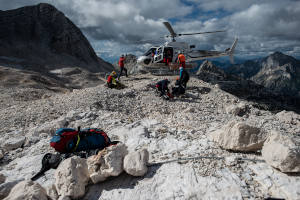
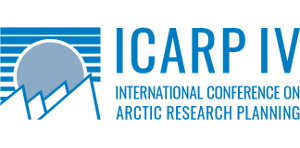 PRA ICARP IV
PRA ICARP IV
